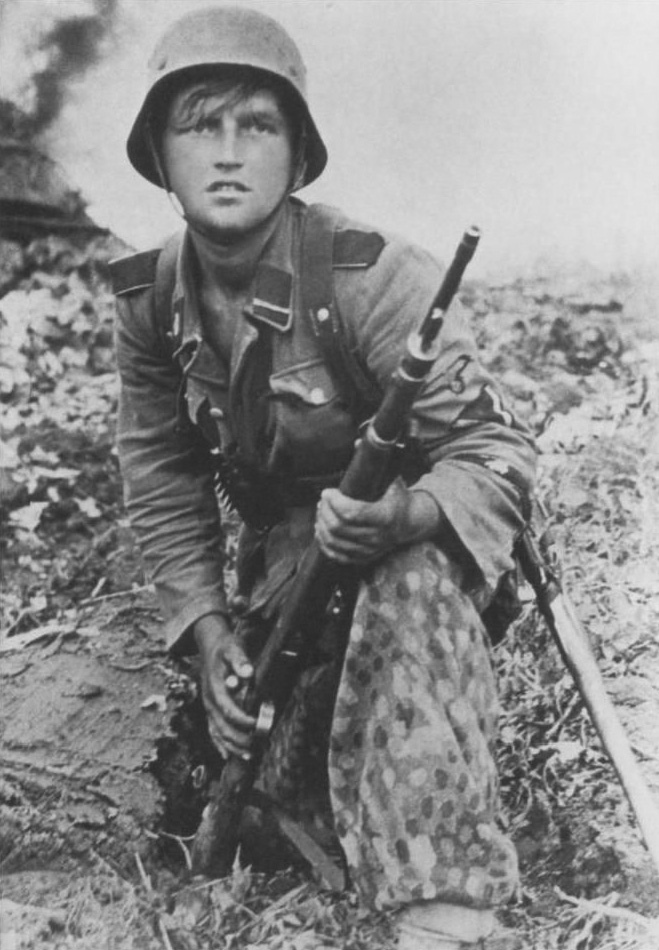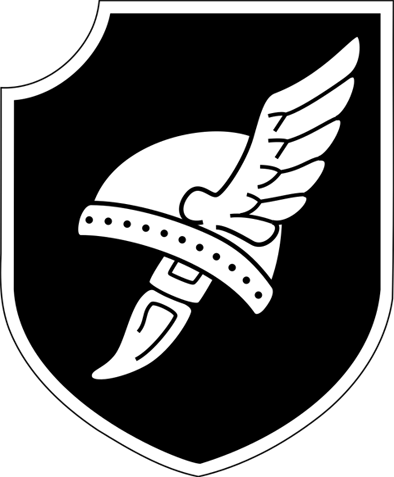Interview with Knight's Cross winner Wilfried Richter, SS-Obersturmführer of SS-Division 'Totenkopf' and later Panzerjäger (tank hunter) instructor, Germany, 1980.

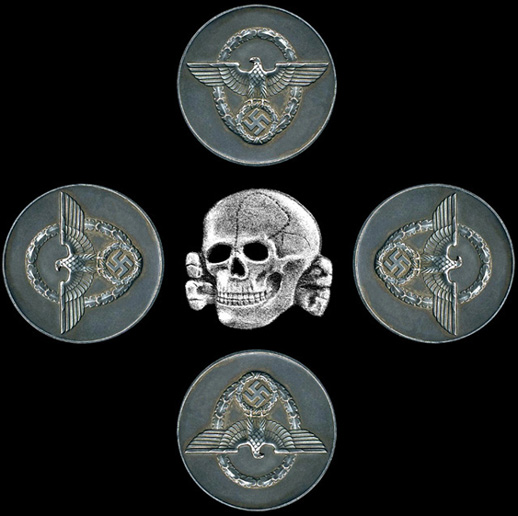
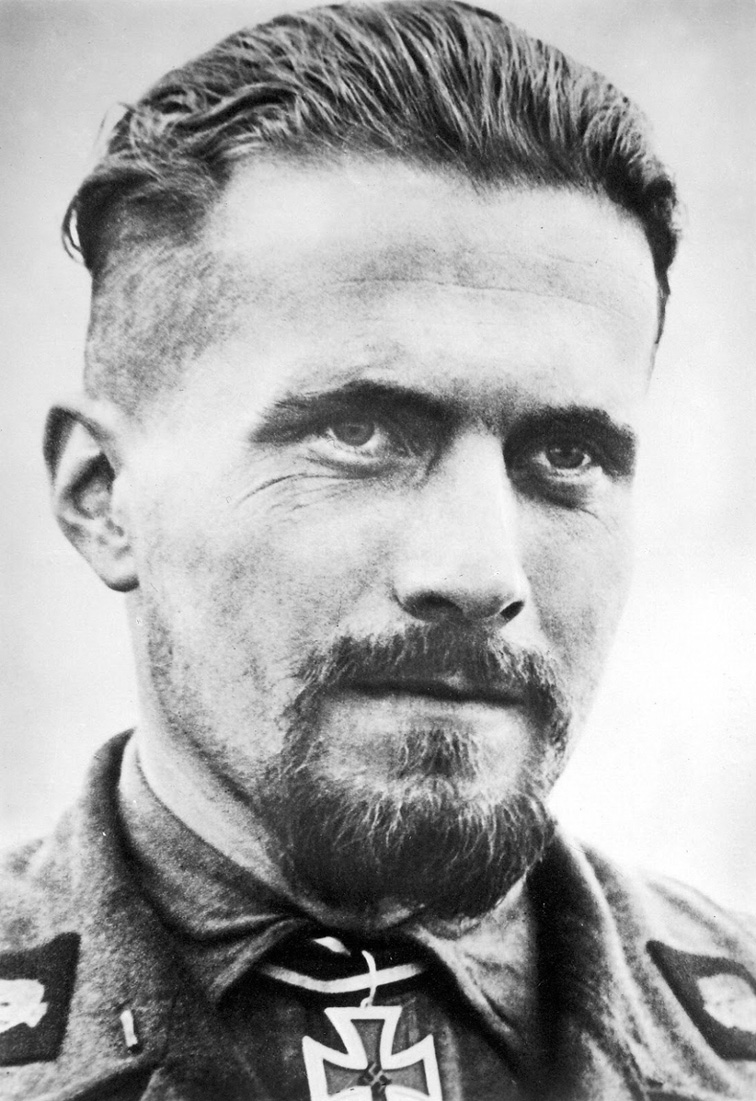

Interview with Knight's Cross winner Wilfried Richter, SS-Obersturmführer of SS-Division 'Totenkopf' and later Panzerjäger (tank hunter) instructor, Germany, 1980.




Wilfried: I came to the SS late, in 1937. I was an early convert to Hitler and
saw what the National Socialists had done for Germany. Gone was the red
terror and uncertainty of the Weimar Republic. Germany had always had
requirements for men to serve in the military for two years, and I knew my
time had to be fulfilled, so I chose to enlist in the Allgemeine-SS to fulfil my
duty. At this time, the SS was seen in Germany as the new vanguard of the
National Socialist idea of a community of people working together for
everyone's benefit.
Everything we did and said was for the benefit of our communities
and nation. No one was left out; we helped the widow, the poor, the sick, and
those who could not help themselves. We strove to build up the best in us,
while carrying along those who needed it. That was the essence of National
Socialism and Adolf Hitler.
What did you have to do to get in?
Wilfried: The SS of 1937 was a well-oiled machine. Strict guidelines had
been laid down to make the SS the most elite of any formation in the Reich.
You had to be extremely fit with no flaws, either physical or mental. Both
doctors and a panel of SS recruiters did the testing. I had to provide family
genealogy showing that my bloodlines were pure Germanic going back to the
1700s, I had no problem with any of the requirements.
I was a member of the NSDAP and that helped me, but I will say it
was not a requirement to be a member. Many SS men did not have time for
politics. Once I was accepted and posted for training, I was assigned to the
15th Company, SS-Standarte 'Deutschland'. We had close to 1,300 men at that
time. We trained daily and had to do all manner of physical exercise and eat
well.
Was there any rivalry with the Leibstandarte?
Wilfried: Not really, we were separated by region. The LAH [Leibstandarte Adolf Hitler] was in Berlin
and served that area with guards and ceremony troops for parades.
Deutschland had the Munich area, which in some terms was more sacred as
we provided guards for the Ehrentemple and Feldherrnhalle. The LAH was
the Führer's guard it is true, but any SS unit was considered loyal and
obedient to the Führer.
[Above: This postcard says: 'Die SS ist der politische Willensträger der Nation - Adolf Hitler'.
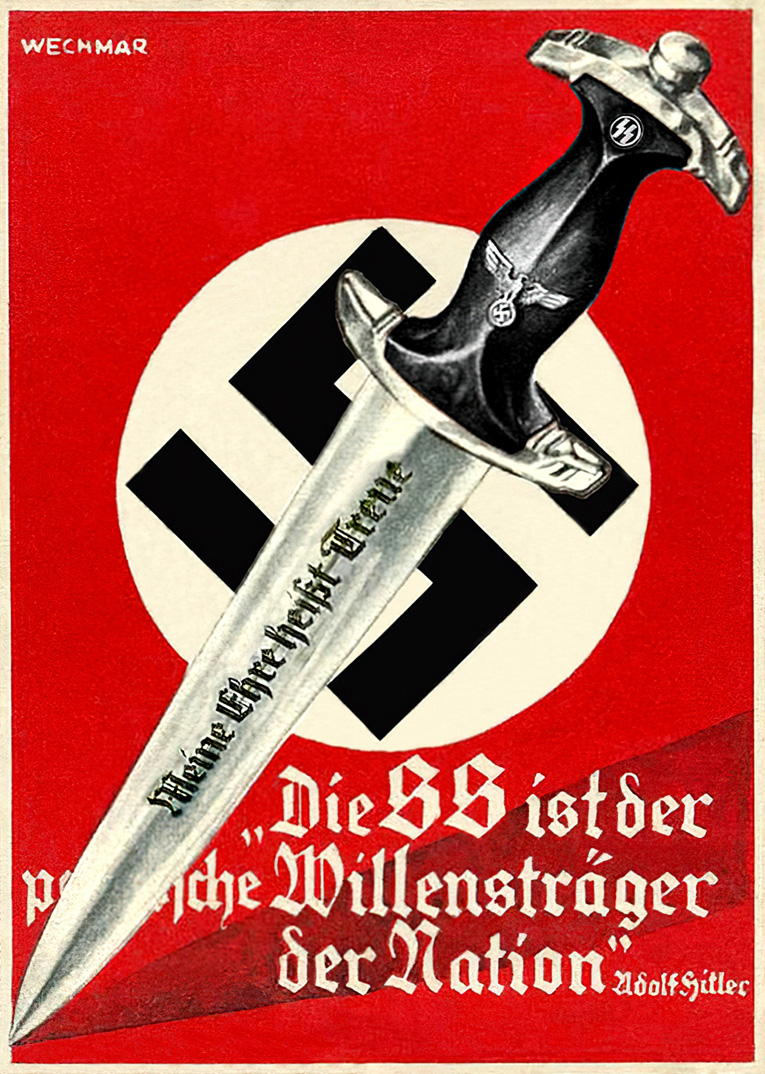
(The SS is the Political Will of the Nation --Adolf Hitler)]
Did you have to sing the Horst Wessel song?
Wilfried: This was a party song, not an SS song. We sang mostly traditional
German marching songs, and 'If All Become Unfaithful, We Remain Loyal' [German: Wenn alle untreu werden, so bleiben wir doch treu, written by Max von Schenkendorf in 1814, this song became very popular with the SS], which was my
favorite. Horst Wessel was a party martyr and was very revered, we would
sing his song at special occasions, but this was not a marching song. After
the war we sang this song more as it was a symbol of faith in our cause.
How were the annexations with Austria and Czechoslovakia? Today it is
written these countries were invaded.
Wilfried: Truth is lost in war, that is what happened, and the Reds controlled
much of the world's press back then, as they do today, so they did not report
positively about these events. In short, Austria was always part of the greater
Reich; Hitler made it legal and official. The throngs of people who welcomed
us tell the real story.
It was shown recently that a famous photo taken by an American
journalist was a lie. It shows a German woman crying while giving the
National Socialist salute. She cried due to the joy of being finally free from
persecution. The press claimed she was Czech and crying because of the dark,
brutal invasion descending on her beloved nation. This was completely false, but this is what the public was shown.
Flowers, hugs, kisses, and drinks were what welcomed the German
troops. Austrian soldiers marched into Germany as a sign of unity, and Czech
soldiers were treated as comrades instead of the enemy. Many joined the SS
or Wehrmacht on the spot. This was the reality. In these cases, photos do not
lie.
German soldiers were welcomed as liberators in both nations, in
spite of the press reporting it was not prudent to send in tanks and armed
soldiers. We had to make sure the small minority who agitated against us did
not cause trouble, which they did not after seeing our guns.
[Above: The crying woman picture discussed above.]
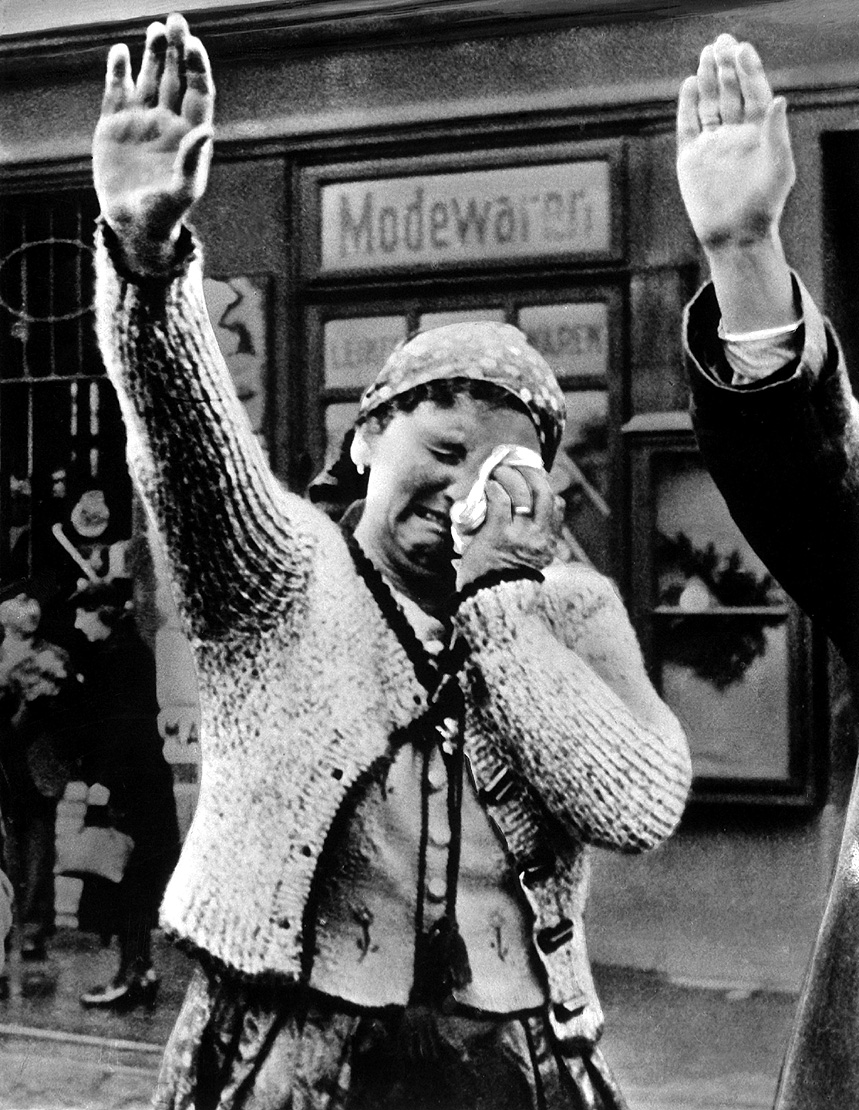
You said you were in the campaign against France, what did you think of the
French soldier?
Wilfried: I was posted as an officer to 'Totenkopf' right before, so we did not
join the fight until late June. I found the French soldier to be tough but poorly
led. The English gave us the most fits and acted poorly in my opinion. The
French were protecting their homes and went out of their way to avoid
damage. While the British took shelter among civilians, and used them as
shields in many instances.
The French did not want this war, much like us, and did not fight
fervently. They surrendered when it was useless to keep fighting. The English
sometimes ignored orders to fall back so they could fight, which was reckless
and caused unnecessary losses. We were furious at their behavior many times, such as when
they would occupy a town and we would call for surrender, as they would be
surrounded.
I witnessed two different times that the English shot at our men under white flags
of truce. The French did not act this cowardly, except their Negro soldiers.
Men of 'Totenkopf' were charged after the war for killing civilians, which
never happened. These deaths were the result of the English choosing to fight
among civilians, which caused deaths, or they would throw away their
uniforms and try to blend in. This made them illegal combatants, spies, if you
will. Spies are often shot within the rules of war.
We faced times when civilians even joined in to fight us, and we
caught some who killed German personnel in cold blood. They were tried
and executed according to international law, this was no crime. Many fell in these fights
before they could be captured. I want to say also that the English in our sector
used illegal ammunition against us, causing our men some very bad wounds.
Most of the French we encountered were scared and just wanted to
get away from war. We fed them and gave them water; our orders were to
treat them kindly and with respect. We gave very strict orders that any looting
or stealing from them would be dealt with severely. Our doctor took the time
to look after many along the way, even treating a baby wounded by grenade
fragments, when one of our men tossed a grenade into a basement not
knowing a family was taking shelter along with English soldiers who had just
fired on us and ran. This is typical of many of the 'war crimes' we are accused
of committing.
What about the action at Le Paradis? Was this not a war crime by killing
unarmed soldiers?
Wilfried: I wish a comrade would write a book refuting this, but laws in the
republic make it hard. As I told you the English did not fight as soldiers, they
fought like criminals in France. Based on what comrades told me, an English
unit was ordered to retreat, but instead they dug in around a farm. When
'Totenkopf' units approached, they were fired on. Our infantry unit surrounded
them and then asked for surrender as they were outnumbered for once and
surrounded.
They put out a white flag, and then as our men approached, they
opened fire on them. Killing soldiers under a white flag of truce is punishable.
To top this off they were using reversed bullets [armor-piercing bullets] that caused catastrophic
injuries when they hit. We brought in surgeons, one of which was French, to treat our many
wounded that needed special care. They confirmed these were not normal
bullet wounds.
After all this, our young, inexperienced soldiers poured it on them,
killing many. I do not believe they were killed in cold blood, and the
survivors who got an innocent man [SS commander Fritz Knöchlein, hung on January 21, 1949] hung are lying. It would be very easy to
make up a story that your unit surrendered and was marched out and shot for
nothing. Comrades have told me there was no massacre. I went to this farm
back in the early 1960s; I saw evidence of a battle, but the wall the shootings
supposedly happened against did not have bullet damage.
My conclusion is this: a few young inexperienced SS soldiers
were so angered at how the English had conducted the battle, that they shot
prisoners down whom they viewed as criminals. Battlefield justice happens
in every army. Therefore, if our men did this, I could see where it would be
overlooked and ignored. The English turn it into a propaganda piece to show
how evil their enemy was. To show the hypocrisy at war's end, the British
took fire from one of our towns, shelled it, killing many civilians, and then
shot soldiers who had resisted. They hide this today.
The second alternative: the English tried further tricks or tactics that
caused nervous young men to open fire on them. I heard hearsay from a
comrade who confirmed the prisoners, once disarmed, became unruly and
were not following orders, young inexperienced soldiers opened fire on the mob. This
of course is if they were even prisoners, as I said, I saw no bullet marks on
the wall. They could have all fell during the fighting or trying to escape the
battle. I do not believe this was a calculated execution done in cold blood, in
spite of what our enemies say. One must be very careful today in wading
through war crime propaganda.
[Above: Men from 'Totenkopf' on a StuG assault gun battery named 'Ursel'. Note the kill rings on the barrel and the 'Totenkopf' skull on the tank (bottom middle), spring, 1942.]
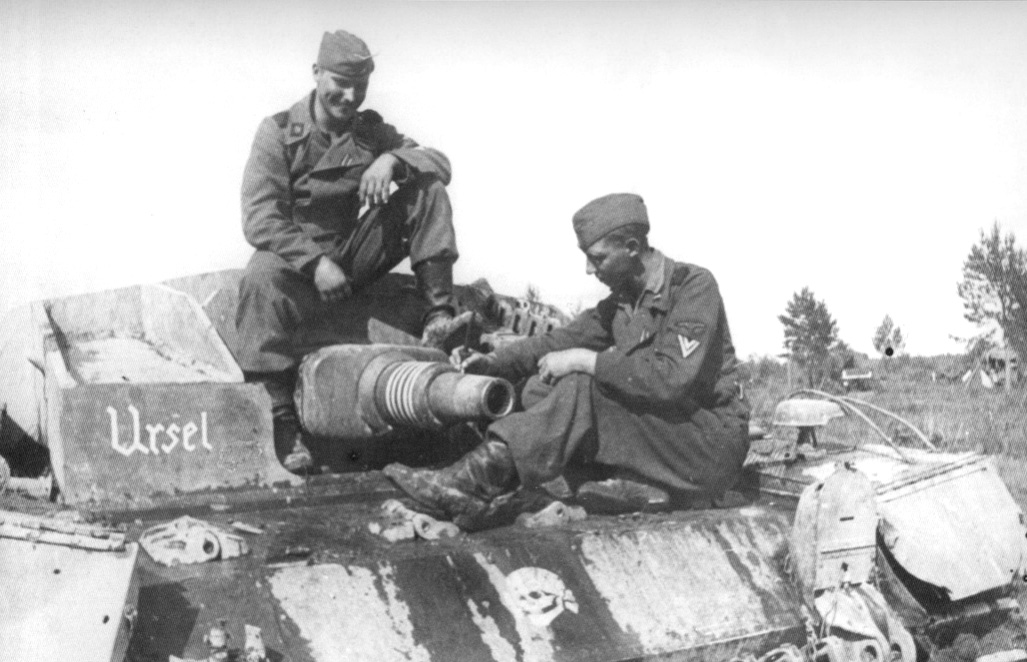
You won the Knight's Cross, how did you earn this?
Wilfried: 'Totenkopf' and Wehrmacht units were surrounded in the Demjansk
Pocket during the winter offensive the Russians launched. It was one of
Europe's coldest winters up to that point, and the Russians held a great advantage
over us. This pocket was quite large and it was hard to defend, but we held,
and with the help of the Luftwaffe, we held out for 4 months against very
strong attacks.
My Knight's Cross came because of a heavy Russian attack. We had
a thin defensive line, which Ivan hit with a massed tank and infantry attack.
I was in command of a group where we had only two Pak [anti-tank guns] and three machine
guns, with some mines. The excellent shooting from the Pak crews knocked
out most of the tanks, but others remained a threat.
I ordered and led an attack as we were going to be overrun. My men
knocked out the other tanks, and we fought Ivan, causing him heavy losses.
I could not stop there, we pushed forward, taking more territory. Ivan had
broken through at other points and surrounded my men; we held out and
defeated all their attacks. After this was over, I surveyed the front and was
in wonder at what we just accomplished. I was at this time in command of an
assault gun battery, but this fight was done in close quarters, often man-to-man.
We held the area for a while, denying it to Ivan, until we were
relieved. The German units in this pocket proved for the first time that aircraft
could keep a ground force supplied. After it was over, we were sent back
home to rest. I was paraded before the press and received far too much
attention and gifts. The men who held out were celebrities for a short time,
and we received an arm badge to commemorate our feat [the Demyansk Shield].
[Above: The Demyansk Shield was instituted by Adolf Hitler on April 25, 1943.]
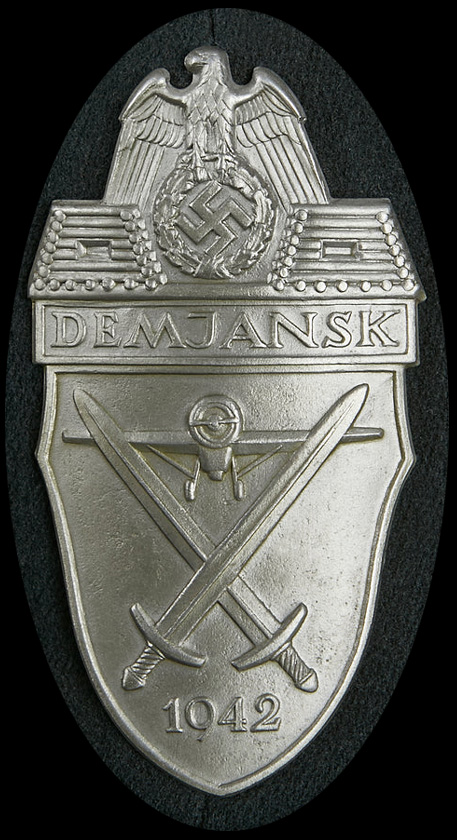
What was it like fighting in an assault gun?
Wilfried: These fine weapons could do much damage to the enemy. They
were cramped inside but afforded the crews good protection. We had an
advantage over our enemies due to our radio communications and range
finders. We could hide in ambush and knock out the heaviest tanks at long
range. The low profile made them hard to see and hit. Unlike the Panzers,
these were on a chassis that was proven, and held up well with little repairs.
Comrades who served on the big ones hated it due to breakdowns
and maintenance needs. They would laugh at our smaller steeds, but we had
to save their skins more than once. I was in command of a battery of long
barrel Stugs, and we had good success against all types of enemy armor.
Once, we spotted a platoon of T-34 tanks driving to an assembly point, their
crews hanging out like on parade. We shot them up, knocking them out and sending the crews fleeing. This was at 150 meters [almost 500 feet], which is how well we
could hide.
[Above: Wilfried Richter.]
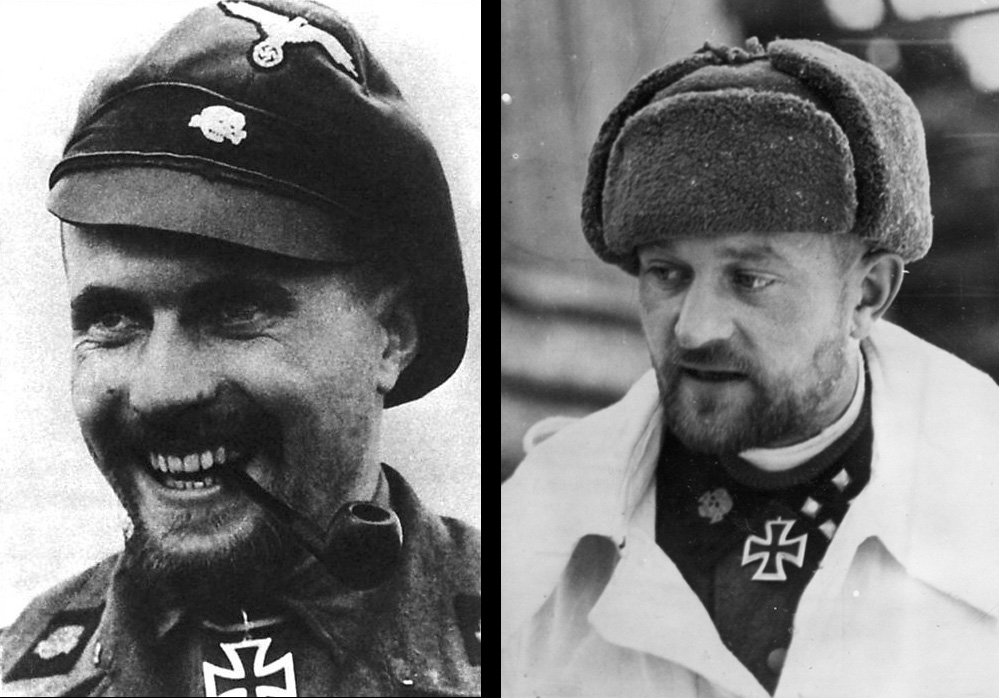
What was the end of the war like for you and did you fight the Americans?
Wilfried: Since the award of the Knight's Cross, I was looked upon as an
expert in fighting and tactics, which I was not. It was ordered that I be an
instructor at Bad Tölz, to train new SS officers in tank hunting. I held this
post until 1945, by then the war was lost, but we knew we had to fight as long
as possible to give people from the east a chance to escape the crimes of the
Red Army.
In March, we were ordered to form a new SS division, which was
far from divisional strength. It was called the Nibelungen Division. We had
remnants from all over, police, border guards, Hitler Youth, wounded SS men,
and old Volkssturm. We gave a good account of ourselves in battle, but too
little too late.
Yes, we only fought the Americans, but by this stage, we were in no
shape for combat. We had old worn-out tank hunters, which could still cause
losses, but the overwhelming numbers were too much for our small force to
hold back. Our leader knew this, and instead of reckless orders, he used us in
small hit and run ambushes. This caused the Americans fits, and made them
very cautious.
Due to this also, they were shooting SS men who surrendered as their
propaganda made us out to be killers and unmerciful fanatics. Our leader gave
a speech; he said the Allies were blinded by rage and hate, and we must not let
that cloud our conduct on the battlefield. That was the difference between
professional soldiers and those raised on propaganda. We cared about our
enemies in the sense they were our lost brothers and wanted them to see the truth. We
went to great lengths to take prisoners and treated them well; I spoke to many
Americans prisoners, and tried to convince them we were not the enemy.
I wanted to convey to them that we fought for Europe to be free from
communism and the death and destruction that it brought. Our fight was a
fight of the West to survive in a world that was turning against us due to the
pest of liberal thought and Marxist ideology that encourages hate and
disorder. We saw this in Russia. When the Marxists took control they killed
all the landowners, academics, religious people, and anyone who morally
disagreed with them.
When we were forced to lay down our arms it was hard to do, but
we hoped the western Allies would soon come to see the danger from the east
and rearm us to help them fight. Instead, we saw ruthless persecution and
covered-up crimes for 3 years, until it dawned on them the communists were their new foes. We still have a stalemate that is undecided, and woe to the
nations if they fail to stop liberal thoughts from consuming them, because
inside is Marxist doctrine in disguise.
Do you think Germany could have won the war?
Wilfried: Events happened too quickly to make measured, negotiated
responses to the crises we faced. We should have done everything to keep
America out, even to the point of giving up land. That doomed us as your
industry could make in one day what it took us one month to make. There are
those who say America wanted war and there was no way to avoid it as
shooting had already started, but wars can always be turned off, always. We
grew too confident too fast. We also had traitors who made victory
impossible; they were not found until July 1944.
[Above: A young warrior from the Panzer Division 'Totenkopf', Warsaw, close to the end.]
[Above: Sign of the Nibelungen Division. In Germanic mythology the 'Nibelungen' was a dwarf-like race that dwelled in the realm of Niflheim, a realm of mist or darkness. They were the guards of treasure of which the hero Siegfried searched for and seized.]
Richter's Knight's Cross recommendation:
'SS-Obersturmführer Wilfred Richter was with his Kompanie, from the 15.03.1942, in the town of Kalitkino. From the start they had to endure constant enemy artillery, aircraft and tank fire.
On the 05.04.1943, in the early morning, they found themselves in combat with the Russians on the northern front of Gruppe Eicke, at the focus point of Kalitkino. 16 T-34s broke in against the defensive positions, themselves supported by an attack from the west and north-west of Kalitkino. Richter and his men only had two Pak guns in support. These destroyed 10 T-34s as well as infantry coming from the north of Kalitkino. Nevertheless the enemy took hold and cut them off. Richter gathered the last of his men and pushed against this enemy incursion, despite the intact enemy tanks and infantry fire. They successfully knocked out 5 T-34s using magnetic teller mines. Their courageous acts gave them success and they pushed into the enemy positions, capturing one enemy tank officer and another enemy soldier.
Throughout the rest of the day they expanded their positions. defended them and remained ready. SS-Obersturmführer Richter's dogged determination and heroism proved to be an example again and again to his weak group of men that were cut-off in this area. Holding out to the last, Kalitkino was held firmly within our control.
The holding of the village for use as a support point two kilometres ahead of the frontline was of decisive importance. The enemy was to the south and east. Moreover, this cornerstone is important as a jump-off point for any future attacks by us.
I recommend SS-Obersturmführer Wilfred Richter for the award of the Knight's Cross to the Iron Cross in recognition of his heroism and courage and the successes connected to it.'
